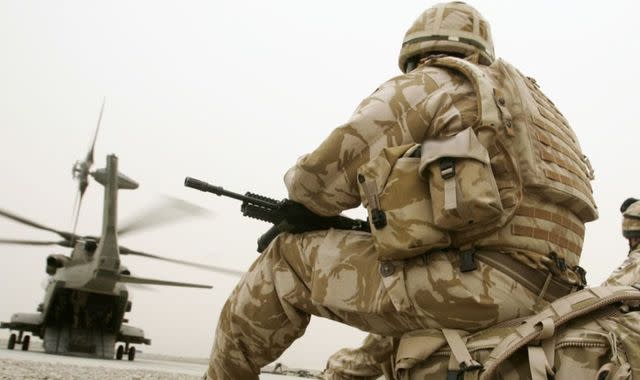UK defence: If the public wants the UK to remain powerful, voters should demand the nation can credibly defend itself against threats

As prime minister, David Cameron oversaw swingeing cuts to defence, while optimistically declaring the UK "should have no less ambition for our country in the decades to come".
He justified the scrapping of warships and jets, as well as thousands of soldiers, sailors and aviators, as a necessary move to combat a financial "blackhole" left by the previous Labour government.
But fast-forward 14 years and the armed forces are still in a funding quagmire - they are just much smaller, with less capacity to absorb shocks and respond to crises.
At the same time, the threat has grown exponentially, with Russia waging a war in Europe, renewed conflict in the Middle East and an increasingly assertive and capable China.
It would be interesting to know what now Lord Cameron, as foreign secretary, thinks as he seeks to respond to these global "fires" with the same armed forces that he took an axe to.
In fact, the only thing that did not diminish since his 2010 defence review was the UK's "global ambitions", though it is becoming apparent that these may have to be adjusted too unless the decline in military strength and readiness to fight a war is restored.
This uncomfortable reality was laid bare in a damning report by a committee of MPs that was published on Sunday.
Summing up the UK's "warfighting readiness" - described as "the ability to deploy and sustain a force that can fight at high intensity in multiple domains for a prolonged period of time" - the Defence Select Committee said they found "this to be in doubt."
The MPs then described an army, Royal Navy and Royal Air Force that are overused, understaffed and lack vital equipment - such as the ability to fend off incoming ballistic missiles. They cannot even recruit enough service personnel to make up for the numbers quitting.
"Either the Ministry of Defence must be fully funded to engage in operations whilst also developing warfighting readiness; or the government must reduce the operational burden on the armed forces," the report warned.
Read more:
Are we heading for World War Three? Experts' verdicts
Grant Shapps rejects claims the army will shrink further
Is conscription coming back?
Yet, it has always been about choice - that is why defence is in such a mess.
Successive governments since the end of the Cold War - not just Mr Cameron's in 2010, though his cuts were among the most damaging because they shrank the military below what many observers regarded to be a minimal level of credible mass - have repeatedly chosen to reduce the size of the armed forces.
Reaping what was rather naively dubbed a "peace dividend", brought on by the collapse of the Soviet Union, politicians sought favour with the public by diverting resources into health, education and growing the economy.
At the same time, the cost of running and equipping the military has soared.
'Pre-war world'
This is a really complex conundrum but it is linked to a loss of economies of scale, so everything from armoured vehicles to submarines becomes more expensive because the government is buying fewer of them but still wants to invest in the development of what is known as sovereign capabilities.
With threats from peer adversaries on the rise, there is demonstrably no more peace dividend - if it ever existed.
Read more from Sky News:
Street fighting in Gaza cities
Woman dies after being mauled by 'XL bully' dogs
Reward offered in chemical attack manhunt
Yet the spending priorities of those in power have not switched back to the mindset of the post-Second World War generation that absolutely understood the meaning of existential peril.
Grant Shapps, the newish defence secretary, used a recent speech to declare that we are in a "pre-war world".
But he then failed to announce any kind of pivot to an all-of-nation, pre-war mindset - which would, by definition, have to involve the wider public and industry, not just the professional military.
General Sir Patrick Sanders, the outgoing head of the army, went a bit further when - in a speech that TV cameras were banned from recording and broadcasting - he reminded the country what a war of national survival means: everyone needs to be ready to play their part.
Enduring military power
Ultimately, though, this is - for now at least - still about choice.
Does the public want the UK to retain its legacy position as a powerful country with nuclear weapons and armed forces that are capable of fighting on the land, at sea, from the air, in cyber space, in the information space and in actual space?
Is it still important to taxpayers that the UK retains its slot - pitted against France - as the most powerful European military in NATO, with one of only five permanent seats at the United Nations Security Council and a desire to defend international rules, rights and norms?
If the answer to these questions is yes, then voters should demand their politicians reprioritise defence.
And that does not just mean more money, weapons and personnel, it is also about reawakening the public to the need to support and be a part of a resilient nation that can credibly deter or defend against threats.
By contrast, if the answer is no, then the UK should stop trying to talk tough, without the means to back up its words with hard, enduring military power.


